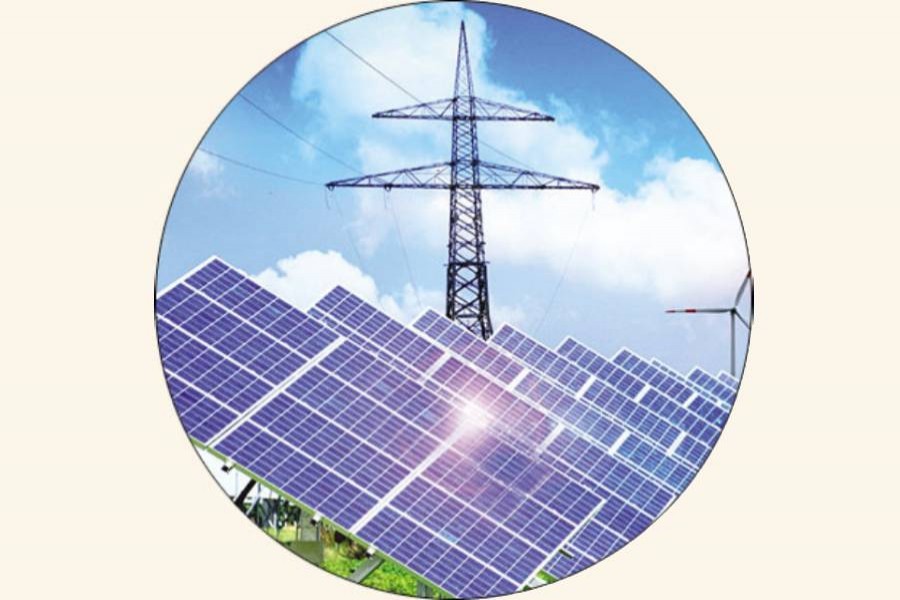Primary fuel supply shortage is blamed for partial idling of electricity generation capacity in the country. On the contrary, idling of the installed power generation capacity has been inviting loadshedding in the country. The war in Ukraine has sparked international crisis and aggravated fossil fuel supply chain. The crisis of fossil fuel supply has demonstrated that over-dependence on imported fuels would lead to serious troubles for the country's economy and equitable social development.
The advocates for renewable energy development in Bangladesh claim that the country could have avoided the present crisis in power generation and supply if timely initiatives had been taken for renewable energy (mainly grid connected solar energy development for power generation) based power generation capacity development. Unfortunately, the much talked about target of the government for adding 10 per cent renewable energy-based power within 2020 could not be attained. Sustainable and Renewable Energy Development Authority (SREDA) of the government reports that renewable energy sources contribute a total of approximately 3 per cent or 909.66 MW (550.73 MW grid connected and 358.92 MW off grid) electricity, (230 MW Kaptai Hydro electric power, 319.83 MW grid connected and 355.83 MW off grid solar power, 2.9 MW (0.9 MW on grid and 2.0 MW off grid) wind power, 0.69 MW off grid Biogas electricity and 0.4 MW off grid Biomass based electric energy) compared to 22,482 MW grid-based installed power generation capacity in the country. It may be mentioned that the major part of the installed power generation capacity is run by fossil fuel. Renewable energy experts consider that the present shortfall of approximately 1,500-2,000 MW electricity (due to demand and supply gap) in the country's power grid could have been avoided if timely initiatives were taken to develop the renewable sources. In particular, solar rooftop potential for generating grid-based electricity could add substantially to power generation capacity in the country. Mr Dipal Barua, prominent renewable energy expert and the president of the 'Bangladesh Solar and Renewable Energy Association' considers that nearly 2,000-2,500 MW electric energy could be added if a minimum of 5 kW electric energy could be generated from each of the rooftops of the existing approximately 1,50,000 government primary and high schools, colleges and nearly 3,00,000 places of worships in the country.
Bangladesh government has set target for generating approximately 40,000 MW electricity in 2030. Mr Dipal Barua considers that additional 4,000 MW electricity can be generated easily if we put efforts for utilising approximately 4,500 garments industry rooftops in the country for renewable power generation. There are several other industrial enterprises which can join hands for capacity enhancements for the rooftop solar power generation. In the meantime, several industries have successfully installed rooftop solar power generation capacity and their generated power not only helps the generating industries' reducing grid power demands but they have started supplying surplus electricity to the national grid under net metering arrangements with the power utility companies. Several other solar parks have been in operations for generating grid connected solar power in the country and more are to come within a short period of time once their installations are complete. The published reports suggest that the apparel and textile industry owners have been showing growing interests for developing their own solar and wind based power generation capacities (Green power) for reducing dependence on grid electricity supply. The industries usually install gas and oil based captive generation capacities, as the grid power is not free of interruptions and fluctuations of voltages. But the growing gas and import fuel supply shortages and their escalating prices raise alarm for them. Moreover, the export oriented industry owners in the country have been realising that green power generation capacity development within their factory premises help them reduce cost, help developing brand values and enable them to bargain better for their export commodity prices with their international buyers.
Published information suggests that nearly 150 garment industries in the country have already obtained LEED certificates (Leadership in Energy and Environment Design) from the Green Building Council of USA. Approximately 500 more industries have registered for obtaining LEED Certificates and have been working for meeting compliance for certification. The industries have been enjoying advantages in business in the international market with their LEED certificates. They also contribute in the global environment conservation efforts.
President of the Bangladesh Solar and Renewable Energy Association further considers that the existing institutional setup under the government for developing renewable energy including the weak SREDA under the Ministry of Power, Energy and Mineral Resources have been inviting some conflicts of interest regarding renewable energy development. He considers that a separate government Ministry/ Division dedicated for renewable energy development in the country will contribute better for ensuring coordinated efforts for financing and regulating supply of quality products for development of solar and wind energy prospects in the country. He believes that the lack of capacity of the BSTI (Bangladesh Standards and Testing Institute) and absence of effective regulatory infrastructure lead to import and marketing of poor quality solar panels and other spares necessary for installations of the solar power capacity development and their efficient operations. In addition, he believes that the recently increased duty and taxes on the imported inverter (a device necessary for converting direct current generated by solar PV cells to alternate current) indicates uncoordinated move on the part of the government hindering the renewable energy capacity building in the country. Experts believe that the government needs to develop efficient legal and organisational capacity to create enabling environment in the country if it wants to harness the potential for developing renewable energy and reduce dependence on fossil fuel based energy infrastructure.
Mushfiqur Rahman, a mining engineer. He writes on energy and environment issues.


